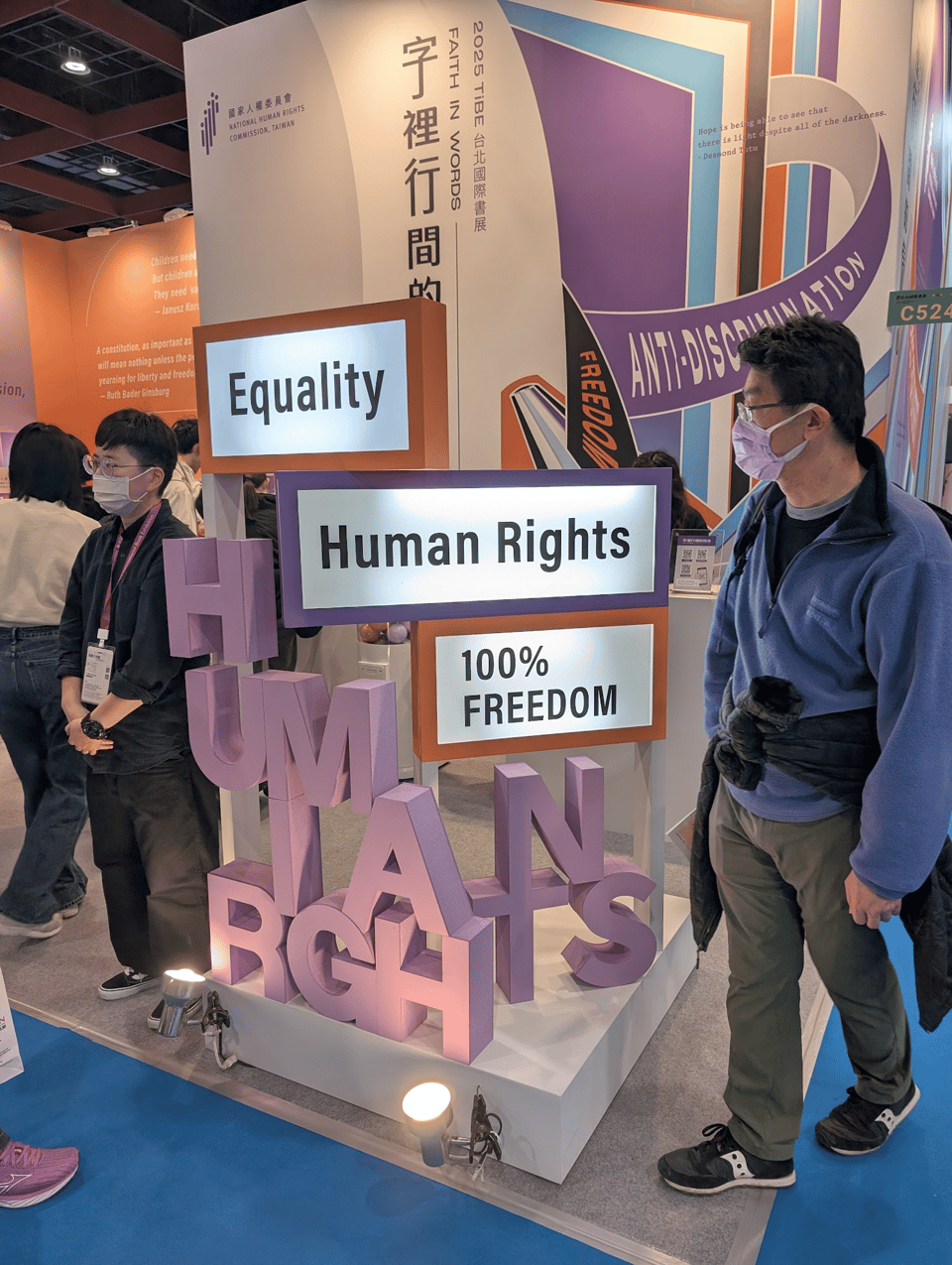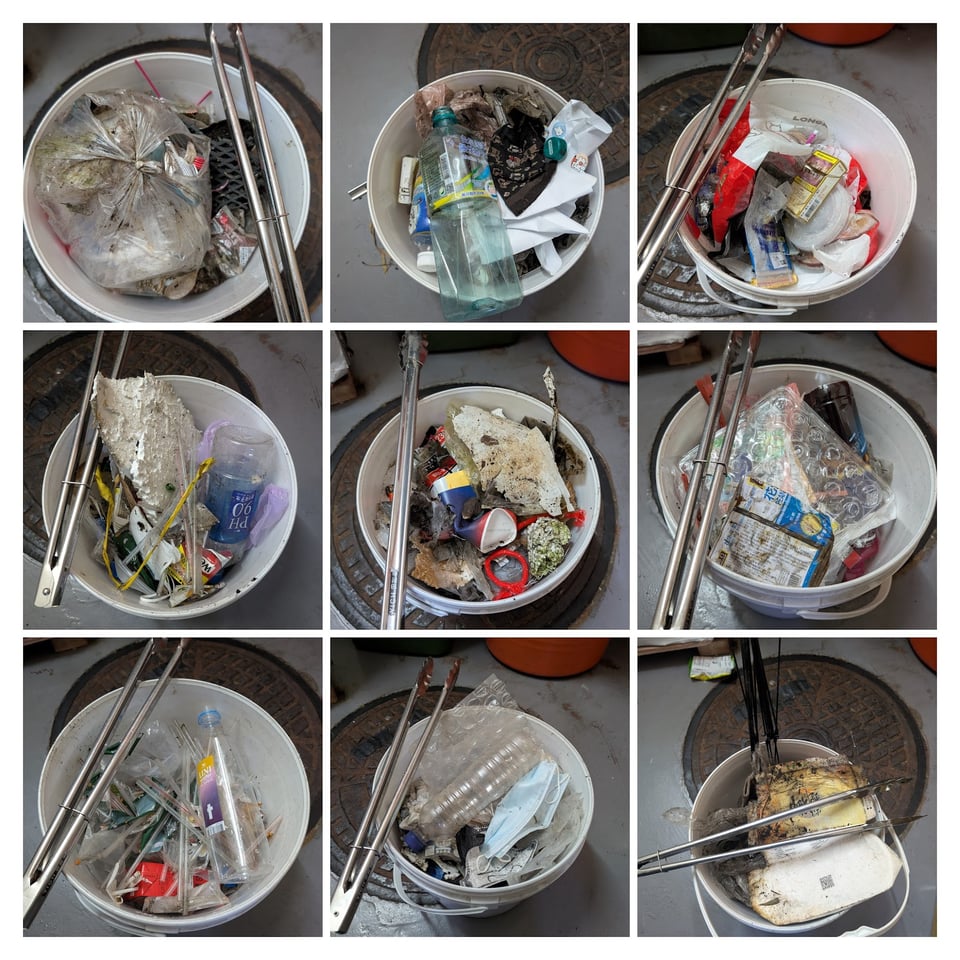A Litter Pill to Swallow

Friends,
I come to you with an important update. Our back door, which has had a draft since at least April of last year, has finally been fixed. You can read about its role in our typhoon experience a few months ago, which probably made the gap worse. A repair guy came and spent a grand total of fifteen minutes putting furry weather stripping around the warped corner. Our building’s general security/admin guy was pretty disappointed I wanted to hire someone instead of doing it myself. Fortunately, I know my limits better than him.
Limits: I recently turned 40, and I celebrated by almost immediately breaking two large dishes and managing to somehow start bleeding while peeling an orange with my fingers. I feel like when I moved to Taiwan, there were a lot of moments where I was the youngest person in the room, and now that happens almost never. At some point I had my first student with parents younger than me and it was all downhill from there.
The opening photo here is from the Taipei International Book Exhibition. This is my first year attending - previous years the dates always overlapped with travel or illness or who knows what, but I was excited to mingle with book lovers this time around. And wow what a crowd they had! 570,000+, according to their official press release. It was so incredibly energizing being around people who are excited about books; I found myself just kind of wandering around in a daze, basking in the good vibes. The timing also had me a little teary walking past the HRC’s booth, then a double whammy of walking past this sign behind an elementary school on my way home. Ah.
Highly recommend you read Michelle Chan Schmidt on the event and Taiwan Travelogue.
Speaking of The Terribleness, back in grad school, Dr. Debra Monroe complained to our class about the ability of social media to be a negative safety valve for social justice, releasing just enough pressure to prevent people from taking more concrete action. And that’s not the only danger of the doomscroll, as Janus Rose thoughtfully argued in last month’s “You Can’t Post Your Way Out of Fascism.”
Of course I don’t know what the best thing for you to do instead, but I’ve got a new habit that I’d like to recommend. I saw a bunch of meetups for beach cleanups in Taiwan and almost signed up, thinking it’d be a good way to meet people, get a little exercise and Vitamin D, and make the world a little better. But then I realized… my neighborhood is pretty dirty and in need of cleaning up. And it’s much closer than the beach. So 2-3 times a week I take a five-gallon plastic bucket and a pair of metal tongs and walk through the nearby blocks, picking up trash. Betel nut bags, cigarette packs, surgical masks, and plastic straws are the worst offenders, but there’s so much more (including a few lottery-eligible receipts I’m hoping will bless me with karmic winnings).
This habit is cathartic in its concreteness: even though the task is near-Sisyphean, due to new litter being deposited every day, I can carve out an area that is better than it was before. Microplastics are slightly less likely to leech into groundwater, the rusted metal and broken glass is not going to injure anyone, and a handful of children will be less likely to think of the space around their home as being an outdoor trashcan. Maybe. I can hope.
And, regardless of its effects, I’m no longer a person who walks past litter and thinks “god, people who litter are terrible” without doing anything about it. Which is nice(instead I constantly say, “that wasn’t there yesterday!”). It helps push me into more productive ways of thinking. There’s always talk about harnessing anger for social change, but in most situations, anger is a nonproductive emotion for me. It makes me want to take my ball and go home. If I focus on the people who litter, on my anger at their selfishness and shittiness, then of course I’m not going to want to pick up after them. Instead, I try a combination of ignoring their existence and being generous in my imagination. The flower vendor on the corner who lets some of his large plastic wrappers blow away in the wind, for example. I’m going to assume that at one point he was able to prevent it from happening as much, and might have chased after them, but now he’s no longer physically capable of chasing, so I help him out. Maybe that’s completely untrue! But if I assume the better possibility, even if it’s a very unlikely one, then I have a little more peace of mind and can more easily do my small part to make things better. In David Foster Wallace’s speech “This is Water,” he makes a similar argument, saying that it costs us nothing to assume that the car that cuts us off is taking a sick child home or that the bad-tempered customer ahead of us in line at the grocery just got some devastating news right before our encounter, and that assuming the best leads to our own mental health being a little better. (Do you know of someone else who has written similarly? I’d love to have it, so I don’t have to recommend DFW for it.)

While in grad school, struggling with my thesis, baking an absurd amount of bread fulfilled something similar in me - the act of making something physical at a time when I was struggling with chasing an ephemeral, uncertain artistic goal. And now, I have my uncertain, probably ineffective ways of trying to help change the whole world, but I also have my certain minuscule way to make my tiny corner of the world a better place too. And that feels good.
People, especially foreigners, are quick to blame a lack of public trashcans for any litter in the city. But that lack is connected to a more holistic policy that seems to keep the city cleaner. Instead of dumpsters, people take their trash to the infamous musical trash trucks which pull up to various stops a few nights of the week. Recycling is free, but general trash goes into specially tagged bags you have to pay for, encouraging people to generate less trash and be more careful about recycling. Public trashcans work against this - people would take out their household trash and deposit there instead of having to deal with the timing or fee of using the trash truck. Now does the same policy lead to more littering? You can find arguments both ways online, but I don’t think so. There’s litter in Taipei, of course, but it’s comparable to many other cities. Neighborhood by neighborhood varies a lot, of course, just like any city, but from my narrow perspective it seems less than Busan or New York, more than Tokyo or Kyoto, maybe about the same as Seoul or Austin. And in my neighborhood, it’s both sad and hope-inducing that a lot of the litter is quite old. Sad because no one has bothered cleaning it up, hope-inducing because I’m hoping the rate of littering is decreasing. One example is I found a cache of about 30 tiny bottles of cough syrup that were more than a decade old - the remnants of someone with a ~really bad cold~. (Apparently discarded bottles are so common they’re commonly found in marine trash - this is the same as the ones I picked up.) The bottles were tucked into the underbrush on the side of a hill, most intact but a few broken, waiting there for so much time until someone stepped on them or ran over them or picked them up. I’m glad it’s the latter.
My pie-in-the-sky goal is to be able to walk to the top of Liuzhangli Cemetery without finding enough litter to pick up the bucket. If someone knows how I can get someone to come pick up abandoned motorcycles and bicycles, please let me know.
Further reading:
Min Chao does the best unexpected-angle articles on Taiwan. Due to the conversations around USAID, here’s a deep dive into its role in Taiwan. The photos are incredible.
Frozen Garlic’s breakdown of how a gender quota in Taiwan’s electoral system works, and it’s really fascinating! I don’t think I could have come up with an effective system, but this one seems to work and it’s sort of genius in its simplicity.
Will Boast’s tour of the literary and philosophic history of indigestion is quite… nourishing! I love this kind of meandering.
I feel like there is some unseen hand that guides a cycle of cute animals in the spotlight. From hippos to red pandas to rhinos to otters, their preciousness assaults us in waves. But one animal has calmly stood in the background, withstanding the test of time and the limelight: the humble capybara. Gary Shteyngart does the noble animal justice.
I’ve pushed Ed Zitron’s writing at you several times before, but he recently did a podcast episode with WNYC’s On the Media, and it distills down well what is so gross and infuriating about LLMs into a conversational format. The host, Brooke Gladstone, was an excellent complement to him.
Loved this little feel-good piece on a knife shop and its owner in Edom, Texas.
A lot of respect for Chris Kluwe and his recent actions. My deep respect is greatly enhanced by him being so openly a World of Warcraft nerd, of course. (PS, Undermine is so good!)
Carolina and I have really been enjoying rhythm games lately. We are not amazing, like some of my students whose skills are intimidating and frankly a little disturbing, but despite this we still have a great time. A few suggestions: Sayonara Wild Hearts, the Persona series of dance games, and Theatrhythm Final Bar Line, which uses music from the Final Fantasy game series (and thus plucks at a string of nostalgia inside me that runs back to getting Final Fantasy 1 on the NES at about six years old).
The new semester has begun, and mine started on a high note when a Vietnamese student from last semester came to me on the first day with a gift of coffee, condensed milk, and a phin filter. Now, I have a little ritual a few days a week, just after lunch, slowly preparing my tiny cup of cà phê sữa đá, focusing on it, the aroma, the tools, the careful intentionality that we can give to the process if we choose to. I have a lot of friends who get the same thing out of tea, but I’m not quite there yet.
I hope you have a similar little carefully intentional space in your schedule. And if you don’t, I wish you luck and inspiration in finding one.
-g